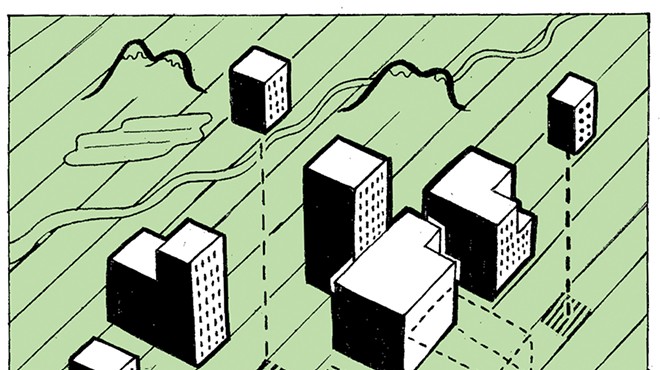Monday, March 31, 2014
David Condon uses the rarest of Spokane mayoral maneuvers: the veto
Today, Mayor David Condon officially used his veto power for the first time in his term, to overturn a recent ordinance intended to close what a majority of Spokane City Council members saw as a major loophole in the state’s growth management policies.
(Explaining the loophole takes a little bit of work, we took a crack at it here. Suffice it to say, it’s allowed dense development to slip into areas where dense development is currently forbidden.)
Basically, the vetoed ordinance prevented the city from committing to extend certain water and sewer services to properties in expanded Urban Growth Area boundaries before the legal challenges to the expansion had been resolved.
But developer groups, and major supporters of Condon, objected intensely to the change: They argued that it could run afoul of state law and expose the city to costly legal action (Center for Justice sent out an email Sunday strongly disagreeing with this argument), that it didn’t follow the proper process through the council, and that it could seriously delay or prevent new development in the county. (Councilman Jon Snyder, the sponsor of the ordinance, estimates the maximum delay would be about a year.)
In vetoing the bill, Condon critiqued the process through which the ordinance was brought forward and passed, and cited “uncertainty” as the primary reason for his veto.
“It is legal uncertainty. It is uncertainty from those who do economic development, it’s uncertainty, quite frankly, as I talk to those who are concerned about the environment, saying, what does this exactly do, Mayor?” Condon said. “I don’t know whether this legislation, for those who are involved in the environmental side, does really what we want to do anyway.”
He also announced an agreement with Spokane County to put any city annexations or additional county urban growth area amendments on hold for a year, while the commissioners and city work on agreements for future growth planning and revenue sharing.
“With this veto, I’m also calling on our county commissioners to bring new jobs and opportunity to Spokane’s region, while maintaining our quality of life,” Condon said.
At 1 pm today, several council members held a press conference to object to the veto. In a press release, Snyder says, “The commissioners have essentially created a shadow city of urban growth around the city of Spokane. Each time they expand the UGA it acts as stealth tax increase for our citizens. With his veto, is the mayor representing the county commissioners' interests or the interests of the citizens of Spokane?”
Merits of the veto aside, historically, this is a huge deal: Spokane mayors have had veto-power for less than 15 years, and in that time they’ve only used the power a handful of times.
Until this year, Condon has had a more friendly council. But with a shift of one vote in the balance of power, and Council President Ben Stuckart willing to strike a hard line over committee assignments and undo the decisions the previous council has made, the prospect of many more mayoral vetoes are a possibility.
And when they’ve vetoed, it usually hasn’t even made a difference. All it takes is five council votes to override a mayoral veto, so vetoes have sometimes been more of a political statement than anything that has made a difference.
Here’s a quick rundown of major mayoral vetoes — or almost vetoes — in the past:
1999: In a vote with a razor-tight margin in the previous November’s election, Spokane moves to a “strong mayor” system, which gives mayors the power to veto city council legislation.
2001: For the the first veto of his term, Mayor John Powers vetoes a collection of amendments to the city's comprehensive plan.
Later that year, he nixes a council plan to loan $800,000 to help the troubled River Park Square parking garage. But an Inlander story noted that he seemed hesitant to use his veto powers: “His supporters maintain that Powers' reluctance to assert his veto-power isn't necessarily a sign of weakness.”
2002: Powers partially vetoes the city budget, and later vetoes a proposed property tax increase. The city council does not overturn either veto. In 2003 he proudly cites the property tax veto as a reason to reelect him. He is not reelected.
2004: Mayor Jim West vetoes a city ordinance to require bicyclists to wear helmets, but the city council, including French, and future mayors Mary Verner and Dennis Hession vote to override it.
2005: Mayor Jim West threatens to veto an ordinance that would grant city benefits to domestic partners. But after a sex scandal surrounding West is published in the Spokesman-Review, and the council gets enough votes to override the veto, West decides not to.
2008: Mayor Mary Verner considers vetoing an ordinance allowing big-box stores in the Southgate residential neighborhood, in particular because of a change by the city council to allow even larger stores than originally intended. The change angered many, including Jon Snyder, who said “the neighborhood was promised a full planning process and what they got was a couple-day charette and then they got the rug pulled out from under them.”
“It is my strong desire to veto [a] portion of the ordinance,” Verner wrote, according to an Inlander story.
Instead, she chose a more mild form of protest: refusing to sign the ordinance.
2009: Mary Verner exercises her first mayoral veto, attempting to strike down new shoreline development restrictions next to Latah Creek. But the City Council came together to push it past the veto. It takes four votes to pass something on the council. It only takes five to override a veto.
(Al French, now a current county commissioner highly critical of the city’s UGA decision, was one of two council votes to supporting a veto.)
2011: Condon hits Verner for not vetoing the water rate increase back in 2011. He used it as ammunition in a debate.
"Well then I would ask the mayor, why did she not veto [the water rates]. She had two opportunities to veto it, she could have vetoed the structure last year, and she could have vetoed the 16 percent increase across all that structure just a couple weeks ago," Condon told Verner in September 2011.
After losing the election, Verner vetoes one specific comprehensive plan zoning change up on the South Hill, but the council overrides her.
2014: Condon chooses to veto the UGA ordinance.
“[The veto measure is] one that I’ve contemplated in past actions,” Condon says, “There’s another way that mayors don’t have to do anything, and that is just to allow them to come effect. I have not done that…. You want to look at, where we are at with the process, how are we getting there.”
In many of the cases, he says, there have been bills he didn’t personally agree with, but the council and the administration have been able to negotiate over those concerns.
Tags: veto , mayor , Spokane City Council , David Condon , News , Politics , Image , Video


























